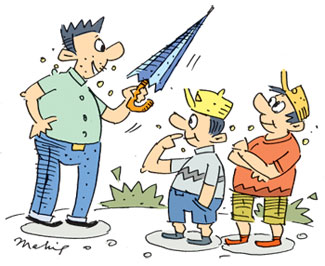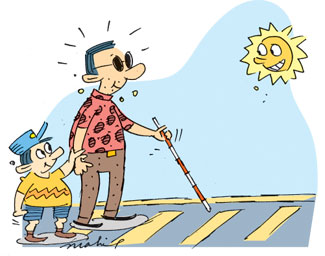|

by R. S. Karunaratne
Many uses of 'always'
'Always' usually occurs in the normal mid position for adverbs.
I always try to get up early in the morning.
|

Father always carries an umbrella whether it rains or not. |
She has always been a good friend.
There is always someone in the director's room.
You have always supported me financially.
We cannot always watch the same film on television.
We do not use 'always' at the beginning of a declarative or
interrogative clause.
We always make sure our classroom is in good order.
Father always carries an umbrella whether it rains or not.
Do you always watch cartoons on TV?
Can you always eat bread and dhal?
Does she always carry tales to the boss?
We can use 'always' at the beginning of an imperative clause.
Always help blind people to cross the roads.
Always tell the truth.
Always count the money before leaving the bank.
Always wash your hands before taking meals.
'Always' is frequently used in the progressive tenses.
The class teacher is always blaming Nimal for not doing his homework.
Father is always grumbling about money.
He is always thinking of his children.
Nayana is always smiling.
'Always' sometimes occurs along with 'can' or 'could' referring to
options.
She can always find another job.
I could always leave office when there is no work.
|

Always help blind people to cross the roads. |
You could always contact me through e-mail.
I can always accommodate you at my boarding house.
'Always' frequently occurs with 'think' and 'remember.'
Mother always remembers her children.
We use 'as always' to refer to a particular event which is seen as
typical of all such events.
As always, they are doing the publicity.
As always, it is a pleasure to get a letter from you.
Simple past tenses are sometimes possible with 'always' when it
refers to 'time up to now.'
I always knew I could depend on you.
(This is equal to 'I' have always known).
Starters :
by R. S. Karunaratne
Introduction to gender
Gender in English grammer refers to the division of nouns into
masculine (male living things), Feminine (female living things) and
neuter (animals, plants and non-living things).
We use the pronouns 'he, him, his' with singular masculine nouns
referring to human beings.
The king rules his kingdom.
|

People live in houses. Some of them are small and others are
big. |
He is loved and respected by his subjects.
Ministers meet him regularly.
We use the pronouns 'she, her, hers' with singular feminine nouns
referring to human beings.
The queen travels with the king. She is young and beautiful. Her
carriage is drawn by two white horses.
We use the pronouns 'it' and 'its' with singular nouns referring to
animals, plants and non-living things.
The dog wags its tail. It protects its master's property.
We use the pronouns 'they, them' and 'theirs' with plural nouns
referring to living and non-living things.
People live in houses. Some of them are small and others are big.
They are built to last for a long time.
Although the pronouns 'it' refers, to an animal, we can use 'he, him,
his' or 'she, her, hers' when we think of the animal as a person.
Jessie is my pet dog. She is fond of me.
Sometimes we use 'she' for cars, motorcycles, boats and ships.
A: How is your new car?
B: She is running beautifully.
We can use 'she' for countries, but 'it' is more common in modern
English. For certain jobs and positions we use different words for males
and females. Man: Woman; actor; actress, bridegroom; bride; duke;
duchess; hero; heroine; host; hostess etc.Mayor can be a man or a woman.
In British English mayoress is the wife of a mayor.
Some words ending in '-ess', such as 'authoress and poetess; are no
longer used. Use 'author' and 'poet' for both men and women. Similarly
we use 'actor' for both males and females. 'Manager' can be used for
both males and females. 'Steward' and 'stewardess' have been replaced by
'flight attendant'. Instead of 'policeman' and 'policewoman' you can use
'Police officer' for both males and females.
Some words ending in '-man' do not have a common feminine equivalent.
No woman would like to be called 'Chairwoman', firewoman', or
'spokeswoman'. Today we use 'chairperson' and 'spokesperson'. However,
some people still prefer to use 'spokeswoman'. 'Firefighter' can be used
for both males and females. |

